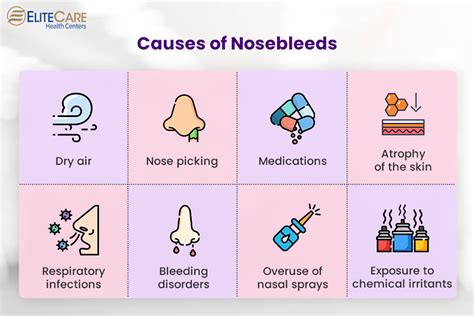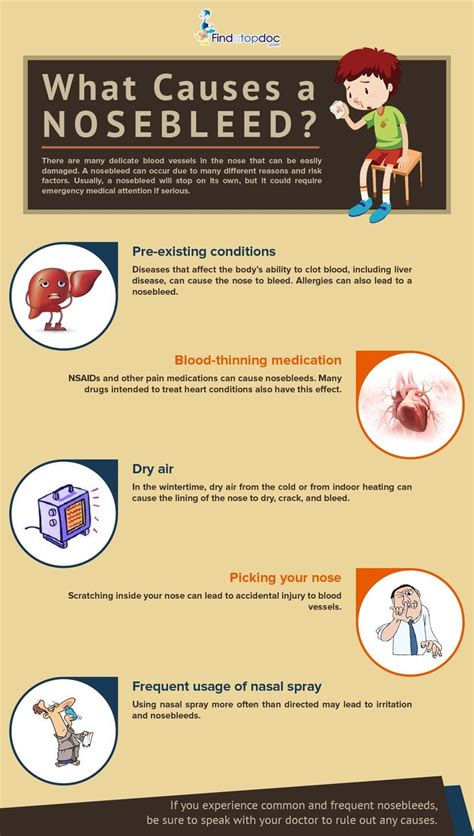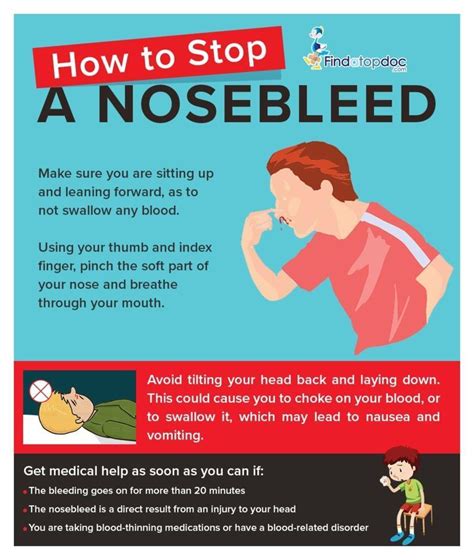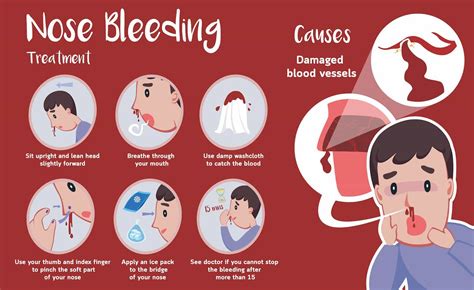Intro
Discover the common causes of nose bleeds, including dry air, allergies, and sinus pressure, to understand and treat nasal bleeding effectively.
Nose bleeds, also known as epistaxis, are a common condition that can occur in anyone, regardless of age or health status. They can be caused by a variety of factors, ranging from minor irritations to more serious underlying health conditions. In most cases, nose bleeds are not a cause for concern and can be easily treated with simple first aid measures. However, in some instances, they can be a sign of a more serious condition that requires medical attention.
Nose bleeds can be frustrating and scary, especially if they occur frequently or are heavy. It's essential to understand the causes of nose bleeds to take preventive measures and seek medical attention if necessary. Some people may experience nose bleeds due to environmental factors, while others may be more prone to them due to underlying health conditions. By understanding the causes of nose bleeds, individuals can take steps to reduce their occurrence and prevent complications.
The importance of understanding the causes of nose bleeds cannot be overstated. Not only can it help individuals take preventive measures, but it can also help them recognize when to seek medical attention. In some cases, nose bleeds can be a sign of a more serious condition, such as high blood pressure, a bleeding disorder, or a tumor. By being aware of the potential causes of nose bleeds, individuals can take a proactive approach to their health and seek medical attention if they experience frequent or heavy nose bleeds.
Common Causes Of Nose Bleed

Some of the most common causes of nose bleeds include dry air, allergies, colds, and sinus infections. Dry air can cause the nasal passages to become dry and cracked, leading to bleeding. Allergies, colds, and sinus infections can cause the nasal passages to become inflamed and irritated, leading to bleeding. Other common causes of nose bleeds include nose picking, blowing the nose too hard, and using certain medications, such as blood thinners.
Environmental Factors
Environmental factors can play a significant role in causing nose bleeds. For example, living in a dry climate or spending time in air-conditioned spaces can dry out the nasal passages, leading to bleeding. Exposure to pollution, chemicals, or other irritants can also cause nose bleeds. In addition, changes in altitude or air pressure can cause the nasal passages to become inflamed and irritated, leading to bleeding.Medical Conditions That Can Cause Nose Bleed

Certain medical conditions can increase the risk of nose bleeds. For example, high blood pressure can cause the blood vessels in the nose to become fragile and prone to bleeding. Bleeding disorders, such as hemophilia, can also increase the risk of nose bleeds. Other medical conditions that can cause nose bleeds include tumors, vascular malformations, and inherited disorders, such as Osler-Weber-Rendu syndrome.
Treatments And Prevention
Fortunately, most nose bleeds can be treated with simple first aid measures. Applying pressure to the nose, elevating the head, and using a humidifier can help to stop the bleeding. In some cases, medical attention may be necessary to treat underlying conditions or to stop the bleeding. Preventive measures, such as using saline nasal sprays, avoiding nose picking, and staying hydrated, can also help to reduce the occurrence of nose bleeds.Signs And Symptoms Of Nose Bleed

The signs and symptoms of nose bleeds can vary depending on the severity of the bleeding. Common signs and symptoms include bleeding from one or both nostrils, swelling of the face or nose, and difficulty breathing. In some cases, nose bleeds can be accompanied by other symptoms, such as headaches, dizziness, or lightheadedness.
When To Seek Medical Attention
While most nose bleeds are not a cause for concern, there are certain situations in which medical attention is necessary. If the bleeding is heavy or does not stop after 20 minutes of applying pressure, medical attention is necessary. If the bleeding is accompanied by other symptoms, such as difficulty breathing, chest pain, or severe headache, medical attention is also necessary.Diagnosis And Treatment Of Nose Bleed

Diagnosing the cause of a nose bleed typically involves a physical examination and medical history. In some cases, additional tests, such as blood tests or imaging studies, may be necessary to determine the underlying cause of the bleeding. Treatment for nose bleeds depends on the underlying cause and may include medications, such as blood thinners, or procedures, such as cauterization or packing the nose.
Home Remedies For Nose Bleed
There are several home remedies that can help to stop nose bleeds and prevent future occurrences. Applying pressure to the nose, elevating the head, and using a humidifier can help to stop the bleeding. Saline nasal sprays and drops can also help to moisturize the nasal passages and prevent bleeding. Avoiding nose picking, blowing the nose too hard, and using certain medications, such as blood thinners, can also help to reduce the occurrence of nose bleeds.Prevention Of Nose Bleed

Preventing nose bleeds involves taking steps to reduce the occurrence of bleeding. Using saline nasal sprays and drops can help to moisturize the nasal passages and prevent bleeding. Avoiding nose picking, blowing the nose too hard, and using certain medications, such as blood thinners, can also help to reduce the occurrence of nose bleeds. Staying hydrated, avoiding exposure to pollution and chemicals, and managing underlying medical conditions can also help to prevent nose bleeds.
Complications Of Nose Bleed
While most nose bleeds are not a cause for concern, there are potential complications that can occur. In rare cases, nose bleeds can lead to anemia, infection, or scarring of the nasal passages. In severe cases, nose bleeds can also lead to respiratory distress or cardiac arrest.Conclusion And Final Thoughts

In conclusion, nose bleeds are a common condition that can occur in anyone, regardless of age or health status. Understanding the causes of nose bleeds is essential to taking preventive measures and seeking medical attention if necessary. By being aware of the potential causes of nose bleeds, individuals can take a proactive approach to their health and reduce the occurrence of bleeding.
We hope this article has provided you with a comprehensive understanding of the causes of nose bleeds. If you have any questions or concerns, please don't hesitate to comment below. Share this article with your friends and family to help them understand the importance of nose bleed prevention and treatment.
What are the most common causes of nose bleeds?
+Nose bleeds can be caused by a variety of factors, including dry air, allergies, colds, and sinus infections. Other common causes include nose picking, blowing the nose too hard, and using certain medications, such as blood thinners.
How can I prevent nose bleeds?
+Preventing nose bleeds involves taking steps to reduce the occurrence of bleeding. Using saline nasal sprays and drops can help to moisturize the nasal passages and prevent bleeding. Avoiding nose picking, blowing the nose too hard, and using certain medications, such as blood thinners, can also help to reduce the occurrence of nose bleeds.
When should I seek medical attention for a nose bleed?
+If the bleeding is heavy or does not stop after 20 minutes of applying pressure, medical attention is necessary. If the bleeding is accompanied by other symptoms, such as difficulty breathing, chest pain, or severe headache, medical attention is also necessary.
